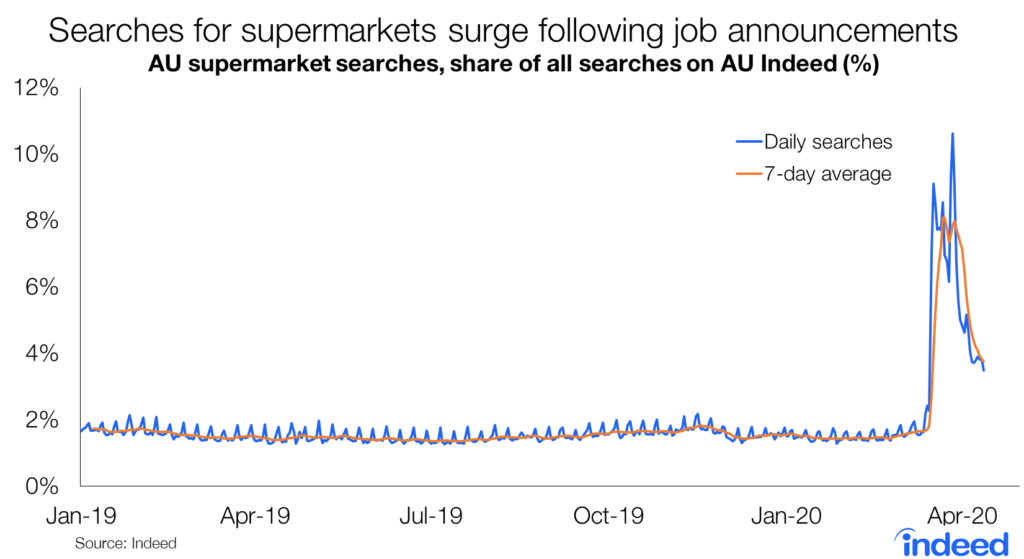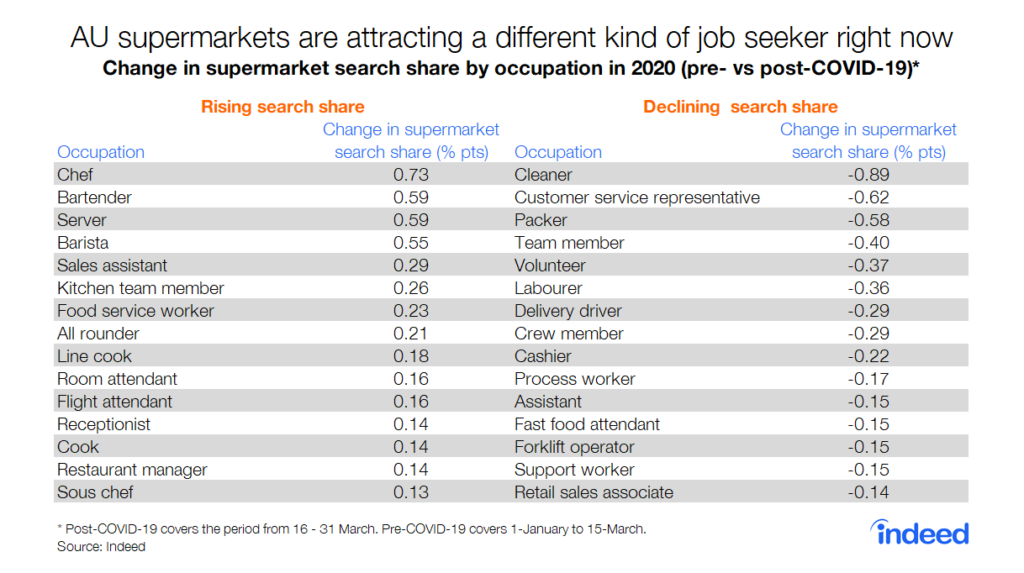Key points:
- Searches for Australian supermarkets have surged, following recent hiring announcements, peaking at more than 7 times normal levels.
- There has been strong growth in supermarket searches among former restaurant workers, most notably chefs.
- Sectors hardest hit by COVID-19, including restaurants, cafes, bars and airlines, have increased their supermarket search share the most.
When Coles and Woolworths announced that they were hiring thousands of workers to meet the demands of Australian consumers, it triggered an unprecedented frenzy of job seeker activity.
Over a two day period, 16 to 18 March, Australian searches for supermarket roles rose 300%. On 28 March, one day after Woolworths announced they were hiring 20,000 more staff and the same day Coles announced they were hiring an additional 5,000 people, searches for supermarkets peaked at 10.6% of all searches on Indeed AU, more than 7 times normal search activity in January and February. Search activity has since moderated, accounting for 4.2% of all searches in April.
By the end of March, supermarkets remained one of the few sectors in Australian where business continued to operate. In fact, supermarkets have struggled to keep up with consumer demand for essentials, such as toilet paper, cleaning supplies, hand sanitizer and, more recently, meat and vegetables. This triggered the need to hire more staff.

Who is searching for supermarket roles?
With many Australians concerned over their job security, supermarkets have become a lifeline for workers who are either unemployed or who experienced a drastic fall in the number of hours they worked.
Combining Indeed search and resume data, we have identified the occupations of job seekers searching for supermarket terms, such as ‘Coles’ or ‘Woolworths’ or more generic terms like ‘supermarket’. Comparing search activity in 2020 across two distinct periods: 1-January to 15-March (‘pre-COVID-19’) and 16-31 March (‘post-COVID-19’), we identify a notable change in the type of job seekers searching for supermarket roles.
Workers displaced by COVID-19, including employees in restaurants, bars, cafes and airlines, increased their supermarket search share. Meanwhile, jobs that have held up better during the crisis, including cleaner, packer and delivery driver, have accounted for a declining share of supermarket searches.
Restaurant workers appear particularly affected. The search share among chefs rose by 0.73 percentage points (% pts) once COVID-19 led to social distancing and then restaurant closures. Before COVID-19 chefs were the 29th most common occupation to search for supermarket roles; now they have jumped to 13th. There were also sizable increases among servers (+0.59% pts), kitchen team members (+0.26% pts), food service workers (+0.23% pts), plus a range of cook roles.
Bartenders (+0.59% pts) and baristas (+0.55% pts) saw strong growth in search activity. Social distancing laws have hardly been friendly to the ever-popular bar and coffee scene. Flight attendants were another group with a rising search share, which is understandable since many were stood down when flights were halted.

The search share for cleaners (-0.89% pts) and customer service representatives (-0.62% pts) fell noticeably. Nevertheless, these two occupations remain the most likely to search for a supermarket role. Customer service representatives accounted for 7.1% of all supermarket searches since the crisis began, compared with 7.7% before COVID-19.
A unique situation has triggered different job seeker behaviour
In a tough economic environment, unique in many respects, job seekers are directing their attention towards the few employers who are actively hiring. Employers who have publicly stated they are hiring have triggered a surge in job seeker activity, whether that be towards supermarkets or telecommunications or even social service providers.
Staff that have been stood down or made redundant are limited for choice in the current economic environment. A chef or cook is poorly placed to find a new restaurant, while a flight attendant can hardly take up employment at a different airline. Consequently, the COVID-19 crisis is encouraging more job seekers to search outside their comfort zone.
Nevertheless, job seeker searches for supermarkets have moderated throughout the first week of April. Many of these roles may already have been filled, dampening job seeker interest. Another important factor is the introduction of government support packages, such as the JobKeeper wage subsidy, that has provided a larger safety net and peace of mind for workers who just weeks ago found themselves out of work, with no pay and limited opportunities. With job security bolstered, Australian workers are better placed to ride-out the COVID-19 crisis or at least take their time planning their next career move.
Methodology
Searches for supermarkets include any searches that feature the company name, or common alternatives, of Australia’s largest supermarket chains, as well as generic terms such as ‘supermarket’. These are measured as a share of all Australian searches on a daily basis.
We connect these searches to unique job seekers through resumes uploaded on Indeed AU. Using a job seeker’s last known position we can then identify what type of workers are searching for supermarket roles.
Comparing the supermarket search share for each job title now, against its pre-COVID-19 level, we can identify the change in the composition of job seekers interested in supermarket roles.






